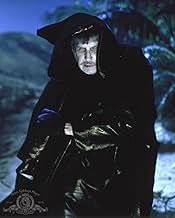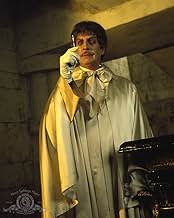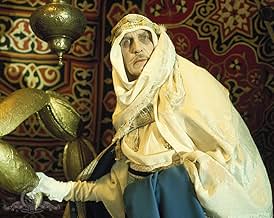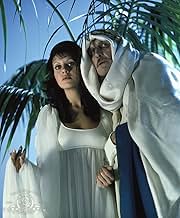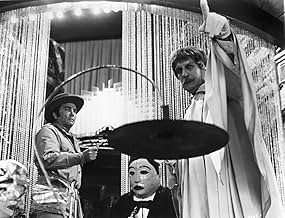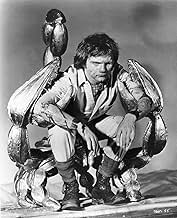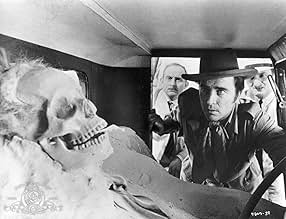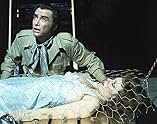NOTE IMDb
6,3/10
7,6 k
MA NOTE
Ajouter une intrigue dans votre langueThe vengeful doctor rises again, seeking the Scrolls of Life in an attempt to resurrect his deceased wife.The vengeful doctor rises again, seeking the Scrolls of Life in an attempt to resurrect his deceased wife.The vengeful doctor rises again, seeking the Scrolls of Life in an attempt to resurrect his deceased wife.
- Réalisation
- Scénario
- Casting principal
- Récompenses
- 1 victoire et 2 nominations au total
John Comer
- Ship's Officer
- (non crédité)
Caroline Munro
- Victoria Regina Phibes
- (non crédité)
Gary Owens
- Narrator
- (voix)
- (non crédité)
Avis à la une
This movie is so similar to the original that I sometimes have trouble remembering which crazy diabolical way of murdering his enemies occurred in which movie. Dr. Phibes returns (even though we DISTINCTLY saw him kill himself in the last movie!) and this time he is a little less focused on revenge and devotes most of his energy to resurrecting his long dead wife. However, have no fear, this does NOT mean he won't be killing many people in the process of restoring her! Yep, once again he comes up with many wacky and twisted ways to kill. So, in essence, if you loved the first movie you'll be happy but if you hated it, it doesn't get any better! I liked both and admit they are a guilty pleasure---they are SO cheesy and silly but I really liked the movies a lot!
UPDATE: I just saw this movie again tonight just after seeing the first Phibes film. I sure had a different reaction this time. While Phibes' murders were once again quite interesting, the film had two major ways that made it very inferior to the original. In the first film, whether right or wrong, Phibes felt he had a legitimate reason to kill. Here in "Dr. Phibes Rises Again" he clearly kills completely innocent people and is much more of a jerk. Also, the plot is not nearly as coherent as the first film and seems like it could have used some re-writing. Still worth seeing but clearly not up to the standards of the first.
UPDATE: I just saw this movie again tonight just after seeing the first Phibes film. I sure had a different reaction this time. While Phibes' murders were once again quite interesting, the film had two major ways that made it very inferior to the original. In the first film, whether right or wrong, Phibes felt he had a legitimate reason to kill. Here in "Dr. Phibes Rises Again" he clearly kills completely innocent people and is much more of a jerk. Also, the plot is not nearly as coherent as the first film and seems like it could have used some re-writing. Still worth seeing but clearly not up to the standards of the first.
Not as good as the first Phibes movie (The Abominable Dr...) but jolly good fun, so long as you're not expecting a horror movie! This is a comedy! The double act of Peter Jeffrey and John Cater as the bumbling police officers Trout and Waverley are a joy. Vincent Price, himself, often portrayed his characters with tongue firmly in cheek, (witness the AIP Corman series of E A Poe titles) and this is no exception. What I would like to know is what is the obsession with dance band leaders and jazz cornet/trumpeters all about? OK, its set in the 20s, (allegedly!) and the mechanical band look like an old dance band of the time, or is it just another in-joke probably lost on most viewers? I'll explain: Beiderbeck (Bix Beiderbecke - legendary cornettist, who died of drink at 28); Hackett (Bobby Hackett - cornettist often compared to Bix for his lyrical style); Baker (Harold "Shorty" Baker - one-time trumpeter for Duke Ellington. Or even Kenny Baker, English trumpeter of considerable ability); Shavers (Charlie Shavers - highly accomplished trumpeter from the 'swing era'); Stewart (Rex Stewart - cornettist with Duke Ellington during 30s/40s). Get the picture? Then we have two band leaders: Ambrose (English dance band leader from the 30s) and Lombardo (Guy Lombardo, Canadian dance band leader from the 20s and 30s). Obsessive or what? Never mind, I just thought I'd point it out!!!! Its still an enjoyable load of old nonsense all the same. 10 out of 10 for cheekiness, but overall a 7.
Some feel that this sequel to 1970's The Abominable Dr. Phibes surpassed the original film with its all-out camp elan, wild-and-woolly murder sequences (it's hard to imagine anything more skin-crawlingly gruesome than the Scorpion Throne sequence in this film), exquisite Deco Egyptienne sets and scenery-chewing performances by such stellar talents as Hugh Griffith, Terry-Thomas (a priceless cameo), Beryl Reid and Peter Jeffrey. Robert Quarry has probably his best role ever as the perfidious Biederbeck, and Valli Kemp makes a fetchingly arch replacement in the role of Vulnavia originated by Virginia North (Kemp's Vulnavia is more in the vein of Maxfield Parrish, while North was arctically Deco). But it's Vincent Price--"how ironic and how clever!"--who rules this bizarre, darkly comic universe of murders and ancient Egyptian occult wisdom. The score by John Gale is also worthy of considerable praise--one of the great horror scores of the latter 20th Century. When is the CD coming out?
I've seen this movie about 7 times, and every time I always notice some little quip or detail that escaped me on first viewing. For trivia buffs, a third film was planned, which was due to bring Phibes face to face with Hitler. Vincent Price was so incensed at the chopping of the original running time of Rises Again that he refused to have anything to do with the third project, so it was abandoned. Director Robert Fuest worked on the Linda Thorson season of the Avengers (the Takeover episode shows some of the Phibes style), and went on to produce a stylish send-up of one of Michael Moorcock's future-sex fantasias.
I've seen this movie about 7 times, and every time I always notice some little quip or detail that escaped me on first viewing. For trivia buffs, a third film was planned, which was due to bring Phibes face to face with Hitler. Vincent Price was so incensed at the chopping of the original running time of Rises Again that he refused to have anything to do with the third project, so it was abandoned. Director Robert Fuest worked on the Linda Thorson season of the Avengers (the Takeover episode shows some of the Phibes style), and went on to produce a stylish send-up of one of Michael Moorcock's future-sex fantasias.
Just saw the movie on DVD. I have never seen it before and I am glad I found it. Of course this is an almost unnecessary re-working of the first movie but it is great for those like myself who can't get enough of Vincent Price's Phibes.
The British cast is very stiff here and the almost chanting 'Harvard Univeristy drama teacher' voice of American actor Vincent Price (when he is thinking/transmitting to Vulnavia as opposed to the stark tone when he uses his electromechanical speaking apparatus) provides grandeur and menace. This is a very challenging role since the story is badly underwritten (everything just exists and appears, no explanations), the dialog is pompous and overwritten and Price must work with no facial expression (or better: with an absolute minimum). He did that with bravura in the first pic and he only slips during the opening close ups at the organ where his facial muscles move a little too much, but I still accept it.
I must admit that I had some difficulties watching such a low budget movie. First I didn's understand what happened. What? The house is in rubbles, torn apart by the villain who stole the papyrus? When? The house was there just a second ago. I thought it was meant to be some kind of theatrical language I didn't understand. To my embarrassment on second viewing I found out that Price says: 'Let's go upstairs' and the organ, like in the first movie acts as an elevator. I missed the visual explanation.
The shot which shows Phibes and the new Vulnavia (where the heck does the beautiful female servant come from? Is she a ghost? Sure not: the writers couldn't come up with any explanation.
Period) rising into the rubbles clearly is a camera moving downward and there is a pitch black background. I needed to re-learn to listen more to dialog. The visual overload of today is hazardous to these kind of films which of course have worked much better in their time.
I agree with most of the comments that state that the deaths are less imaginative than in the first movie but I like this fact that this sequel was made only two years after the original - the look and feel are similar even if some of the lushness is missing.
I like the two policemen acting as a semi working-class, people with a common sense and humor, counterbalance to the Gothic "Phantom of the Opera style" Phibes. I like the way they have given up trying to catch Phibes and these of course are the two we can identify with, yet there is too little material here and some of the scenes with the policemen look like a family gathering from the first movie and of course as in so many sequels: the acting becomes a little too self aware.
The villain, his hoping-to-be wife and his henchmen are all very dull characters so this is basically a Vincent Price/Peter Jeffrey movie with wasted but welcome guest appearances from Terry-Thomas and Peter Cushing. Both wonderful actors with careers mostly made of making the most of bad material.
The 1970s version of late 1920s British Art Deco (since the Paris-fair that introduced the Art Deco style was held in 1925, I'd say it should be rather early 1930s but the cars look more late 20s in both movies) plus the theatrical, magical, Gothic, deep menace of the price-less (pun not intended) Phibes as only Price could have played makes this very low budget film a little treasure, even if it's basically only for those, like me, who can't get enough of the magical world of the wonderfully abominable Dr. Phibes.
The British cast is very stiff here and the almost chanting 'Harvard Univeristy drama teacher' voice of American actor Vincent Price (when he is thinking/transmitting to Vulnavia as opposed to the stark tone when he uses his electromechanical speaking apparatus) provides grandeur and menace. This is a very challenging role since the story is badly underwritten (everything just exists and appears, no explanations), the dialog is pompous and overwritten and Price must work with no facial expression (or better: with an absolute minimum). He did that with bravura in the first pic and he only slips during the opening close ups at the organ where his facial muscles move a little too much, but I still accept it.
I must admit that I had some difficulties watching such a low budget movie. First I didn's understand what happened. What? The house is in rubbles, torn apart by the villain who stole the papyrus? When? The house was there just a second ago. I thought it was meant to be some kind of theatrical language I didn't understand. To my embarrassment on second viewing I found out that Price says: 'Let's go upstairs' and the organ, like in the first movie acts as an elevator. I missed the visual explanation.
The shot which shows Phibes and the new Vulnavia (where the heck does the beautiful female servant come from? Is she a ghost? Sure not: the writers couldn't come up with any explanation.
Period) rising into the rubbles clearly is a camera moving downward and there is a pitch black background. I needed to re-learn to listen more to dialog. The visual overload of today is hazardous to these kind of films which of course have worked much better in their time.
I agree with most of the comments that state that the deaths are less imaginative than in the first movie but I like this fact that this sequel was made only two years after the original - the look and feel are similar even if some of the lushness is missing.
I like the two policemen acting as a semi working-class, people with a common sense and humor, counterbalance to the Gothic "Phantom of the Opera style" Phibes. I like the way they have given up trying to catch Phibes and these of course are the two we can identify with, yet there is too little material here and some of the scenes with the policemen look like a family gathering from the first movie and of course as in so many sequels: the acting becomes a little too self aware.
The villain, his hoping-to-be wife and his henchmen are all very dull characters so this is basically a Vincent Price/Peter Jeffrey movie with wasted but welcome guest appearances from Terry-Thomas and Peter Cushing. Both wonderful actors with careers mostly made of making the most of bad material.
The 1970s version of late 1920s British Art Deco (since the Paris-fair that introduced the Art Deco style was held in 1925, I'd say it should be rather early 1930s but the cars look more late 20s in both movies) plus the theatrical, magical, Gothic, deep menace of the price-less (pun not intended) Phibes as only Price could have played makes this very low budget film a little treasure, even if it's basically only for those, like me, who can't get enough of the magical world of the wonderfully abominable Dr. Phibes.
I bought this one as part of a back to back Dr. Phibes Midnight Feature DVD. I didn't like it quite as much as the original, but it was not completely without its charm. Vincent Price's performance was good (as per usual) and Robert Quarry did well as Biderbeck (Dr. Phibes' foe in this film). As anyone who has seen the original can guess, there's a lot of really elaborate deaths and more of Vincent Price talking through a machine plugged into his neck.
The film picks up with a brief recap of the original (Phibes out to kill the doctors who where operating on his wife when she died). Phibes then arises from the tomb in his basement where he and his wife's corpse were resting for about three years. Phibes has a plan this time to find a secret river of life in Egypt that comes to a pharaoh's tomb once every 2000 years so he can bring his wife back to life and have eternal life. However, Phibes' house has been demolished and a priceless scroll that had the secret of the tomb has been taken. Biderbeck (Quarry) somehow acquired the scroll and intends to find the river for himself and his girlfriend. Both travel to Egypt to find the river of life, and Phibes kills Biderbeck's lackeys along the way in his usual methods.
It's not that bad. It didn't live up to the original, but it still delivered big on the theme deaths. The deaths aren't quite as structured as in the last Phibes film, but they're still pretty fun.
The film picks up with a brief recap of the original (Phibes out to kill the doctors who where operating on his wife when she died). Phibes then arises from the tomb in his basement where he and his wife's corpse were resting for about three years. Phibes has a plan this time to find a secret river of life in Egypt that comes to a pharaoh's tomb once every 2000 years so he can bring his wife back to life and have eternal life. However, Phibes' house has been demolished and a priceless scroll that had the secret of the tomb has been taken. Biderbeck (Quarry) somehow acquired the scroll and intends to find the river for himself and his girlfriend. Both travel to Egypt to find the river of life, and Phibes kills Biderbeck's lackeys along the way in his usual methods.
It's not that bad. It didn't live up to the original, but it still delivered big on the theme deaths. The deaths aren't quite as structured as in the last Phibes film, but they're still pretty fun.
Le saviez-vous
- AnecdotesThere was a lot of hostility between Vincent Price and Robert Quarry, particularly when Price discovered that American International Pictures was planning to replace him with Quarry as their major horror film star. At one point, when Price discovered Quarry singing opera, Quarry said "I'll bet you didn't know I could sing, did you?", to which Price replied "Well, I knew you weren't a fucking actor."
- GaffesAt the end of the film, which takes place in 1928, Phibes sings "Somewhere Over The Rainbow", a song that was first recorded in 1938, 10 years later.
- Citations
Inspector Trout: I'm a bit apprehensive about finding the others, sir. Do you think you know where we are?
Sir Wayne Waverley: Trout, I don't think; I know.
Inspector Trout: I don't think you know either, sir.
- Crédits fousThis time, Phibes laughs just before the last chord of the music after the credits.
- Versions alternativesIn later prints of the film and in the original home video version of it, a scene featuring Vincent Price singing "Somewhere Over the Rainbow" is removed, supposedly for copyright reasons. The film's 2001 DVD version restores the Vincent Price-sung song "Somewhere Over the Rainbow".
- ConnexionsEdited from L'Abominable Docteur Phibes (1971)
- Bandes originalesOver the Rainbow
(uncredited)
Music by Harold Arlen
Performed by Vincent Price
(played over the end titles)
Meilleurs choix
Connectez-vous pour évaluer et suivre la liste de favoris afin de recevoir des recommandations personnalisées
- How long is Dr. Phibes Rises Again?Alimenté par Alexa
Détails
- Date de sortie
- Pays d’origine
- Langue
- Aussi connu sous le nom de
- Le Retour de l'abominable Dr. Phibes
- Lieux de tournage
- Société de production
- Voir plus de crédits d'entreprise sur IMDbPro
Contribuer à cette page
Suggérer une modification ou ajouter du contenu manquant

Lacune principale
By what name was Le Retour de l'abominable docteur Phibes (1972) officially released in India in English?
Répondre


